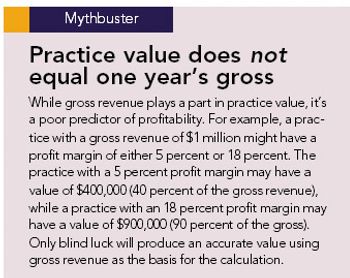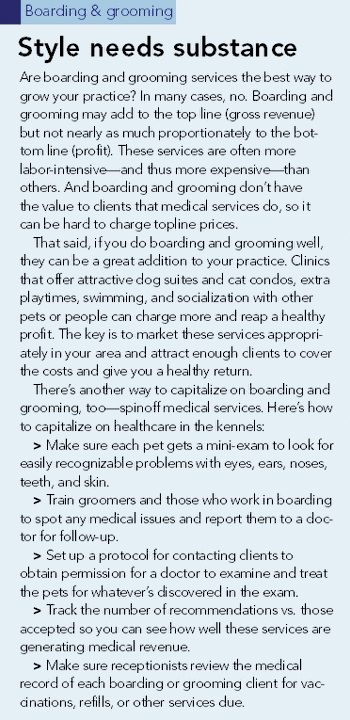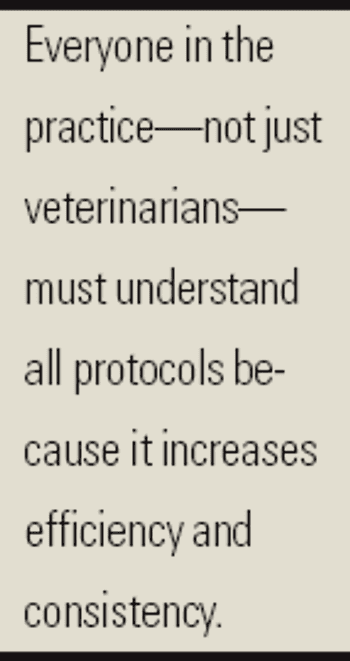
Setting fees properly is an important task in a veterinary practice; yet many hospitals don't really give much thought to how this should be done.

Dr. Felsted is a CPA as well as a veterinarian and has spent the last 15 years working as a financial and operational consultant to veterinary practices and the animal health industry. She also spent three years with the National Commission on Veterinary Economic Issues as CEO. She has written an extensive number of articles for a wide range of veterinary publications and speaks regularly at national and international veterinary meetings. She is the current treasurer of VetPartners, a member of the Veterinary Economics Editorial Advisory Board, a member of the CVPM board of directors and the current treasurer of the CATalyst Council. In 2011, she was awarded the Western Veterinary Conference Practice Management Continuing Educator of the Year and in 2014, the VetPartners Distinguished Life Member Award.Dr. Felsted enjoys exotic international travel, and when the dvm360 team last heard from her, she was headed to the Galapagos.

Setting fees properly is an important task in a veterinary practice; yet many hospitals don't really give much thought to how this should be done.

You're more than your title. And a job description may be the tool you need to clarify your manager's expectations and position yourself for growth in your practice, from raises to promotions.

Q. I'm opening a veterinary practice with grooming services. The groomer wants to lease a room monthly, but I'm not sure how much to charge for rent. Do I charge base rent plus a percentage of her production?

Owners, make sure buyers purchase your practices at a good price.

I'm negotiating the purchase of the practice where I'm employed. The current owner gives discounts to almost everyone-senior citizens, shelters, friends, and clients with multiple pets. How do I reduce the amount of services being given away without alienating a large number of clients?

Polish up your approach to providing these five services, and show clients you're all about good medicine.

I already work a few Saturdays a month and now my boss wants more!

Is it important to consider demographic data when choosing a location to open a new practice? How can I obtain this data?

The way you talk to clients about what you charge and why can help your practice provide good care- or block your progress. Do you need to rethink your role?

Q. How many hours can an associate work and still be considered part-time? Do on-call hours count?

"When deciding on a maternity leave policy, you need to consider the legal requirements as well as the total benefits package you want to offer," says Veterinary Economics Editorial Advisory Board member Dr. Karen Felsted, CPA, MS, CVPM, a consultant at Brakke Consulting Inc. in Dallas.

Discussing money with clients can be downright scary. Learning to present an estimate with poise takes the fear out of this critical task?and improves the odds that clients will say yes to your treatment plan.

I work for a corporately owned, small animal practice on a production basis. We occasionally allow clients to make payments, and we accept checks. When a client doesn't pay or a check bounces, that amount's deducted from my monthly production total, and the client's turned in to a collections agency. If the company then receives payment, should I receive back payment for my services?

If missed charges are slipping out the door, you may be seeing a smaller paycheck and fewer benefits—and you may find it harder to offer high-quality care.

I'm starting a small animal practice, and I'm hoping to add an associate with buy-in potential after two years. Which business entity would be best, a Limited Liability Company (LLC) or Service Corporation?

Whose directions should I follow when the doctors disagree?

It should be straightforward: You tell your clients what to do, and they do it. Aren't client relations supposed to work this way? After all, you're a doctor, you have command of the English language, and your clients love their cats and want to care for them. Unfortunately, compliance doesn't happen as frequently as we'd like, even with intelligent, committed clients. Reversing this trend means understanding-and eliminating-the reasons for client noncompliance.

I'm a solo practitioner with only three employees. Are exit interviews really necessary?